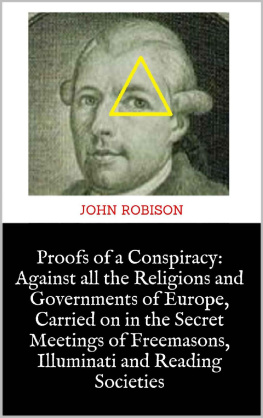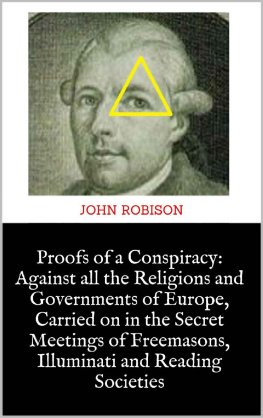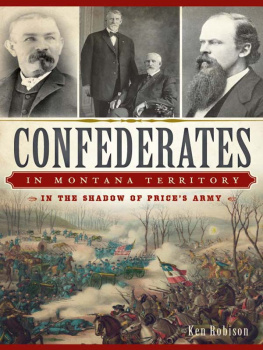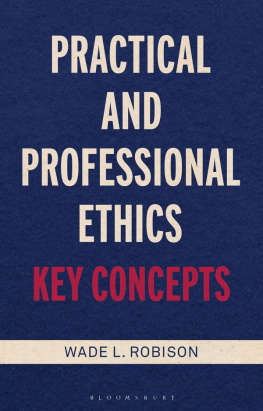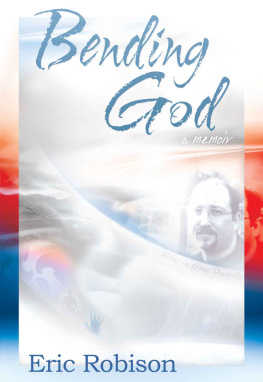John Robison - Proofs of a Conspiracy
Here you can read online John Robison - Proofs of a Conspiracy full text of the book (entire story) in english for free. Download pdf and epub, get meaning, cover and reviews about this ebook. year: 2012, genre: Science / Politics. Description of the work, (preface) as well as reviews are available. Best literature library LitArk.com created for fans of good reading and offers a wide selection of genres:
Romance novel
Science fiction
Adventure
Detective
Science
History
Home and family
Prose
Art
Politics
Computer
Non-fiction
Religion
Business
Children
Humor
Choose a favorite category and find really read worthwhile books. Enjoy immersion in the world of imagination, feel the emotions of the characters or learn something new for yourself, make an fascinating discovery.
- Book:Proofs of a Conspiracy
- Author:
- Genre:
- Year:2012
- Rating:3 / 5
- Favourites:Add to favourites
- Your mark:
- 60
- 1
- 2
- 3
- 4
- 5
Proofs of a Conspiracy: summary, description and annotation
We offer to read an annotation, description, summary or preface (depends on what the author of the book "Proofs of a Conspiracy" wrote himself). If you haven't found the necessary information about the book — write in the comments, we will try to find it.
John Robison: author's other books
Who wrote Proofs of a Conspiracy? Find out the surname, the name of the author of the book and a list of all author's works by series.
Proofs of a Conspiracy — read online for free the complete book (whole text) full work
Below is the text of the book, divided by pages. System saving the place of the last page read, allows you to conveniently read the book "Proofs of a Conspiracy" online for free, without having to search again every time where you left off. Put a bookmark, and you can go to the page where you finished reading at any time.
Font size:
Interval:
Bookmark:
PROOFS OF A CONSPIRACY AGAINST ALL THE RELIGIONS AND GOVERNMENTS OF EUROPE, CARRIED ON IN THE SECRET MEETINGS OF FREE MASONS, ILLUMINATI, AND READING SOCIETIES, COLLECTED FROM GOOD AUTHORITIES,
BY JOHN ROBISON, A. M.
PROFESSOR OF NATURAL PHILOSOPHY, AND SECRETARY TO THE ROYAL SOCIETY OF EDINBURGH.
Nam tua res agitur paries cum proximo ardet.
THE FOURTH EDITION.
TO WHICH IS ADDED, A POSTSCRIPT.
NEW-YORK:
Printed and Sold by George Forman, No. 64, Water-Street, between Coenties and the Old-Slip.
[1798]
TO THE RIGHT HONORABLE
WILLIAM WYNDHAM
SECRETARY AT WAR. &c. as &e. SIR,
It was with great atisfaction that I learned from a Friend that you coincided with me in the opinion, that the information contained in this performance would make a ueful impreion on the minds of my Countrymen.
I have preumed to incribe it with your Name, that I may publicly espres the pleaure which I felt, when I found that neither a eparation for thirty years, nor the preure of the mot important buines, had effaced your kind remembrance of a College Acquaintance, or abated that obliging and polite attention with which you favored au in thoe early days of life.
The friendhip of the accomplihed and the worthy is the highet honor; and to him who is cut off, by want of health, from almot every other enjoyment, it is an inetimable bleing. Accept, therefore, I pray, of my grateful acknowledgements, and of my earnet wihes for your Health, Properity, and increaing Honor.
With entiments of the greatet Eteem and Repect, I am, SIR, Your mot obedient, and mot humble Servant, JOHN ROBISON.
EDINBURGH September 5, 1797.
QUOD i quis ver vitam ratione gubernet, Diviti grandes homini unt, vivere parc quo anima: neque enim et unquam penuria parvi, At claros e homines volurunt atque potentes, Ut fundamento: tabili fortuna maneres,
Et placidam poent opulenti degere vitam: Nequicquam.--quoniam ad ummum uccedere honorem Certantes, iter infetum fecre via, Et tamen a ummo quai fulmen dejicit ictos Invidia interdum contemptim in Tartara tetra.
Ergo, Regibus occiis, ubvera jacebat Pritina majetas oliorum, et ceptra uperba; Et capitis ummi prclarum inigne, cruentum, Sub pedibus volgi magnum lugebat honorem: Nam cupid conculcatur nimis ante metutum. Res itaqe ad ummam fcem, turbaque redibat, Imperium ibi cum ac ummatum quique petebat.
LUCRETIUS, V. 1153.
Note: The following Latin and English texts of the above passage were not in the original book, they are supplied for reference.--JBH
...quod siquis vera vitam ratione gubernet, divitiae grandes homini sunt vivere parce aequo animo; neque enim est umquam penuria parvi. at claros homines voluerunt se atque potentes, ut fundamento stabili fortuna maneret et placidam possent opulenti degere vitam, ne quiquam, quoniam ad summum succedere honorem certantes iter infestum fecere viai, et tamen e summo, quasi fulmen, deicit ictos invidia inter dum contemptim in Tartara taetra;...
Ergo regibus occisis subversa iacebat pristina maiestas soliorum et sceptra superba, et capitis summi praeclarum insigne cruentum sub pedibus vulgi magnum lugebat honorem; nam cupide conculcatur nimis ante metutum. res itaque ad summam faecem turbasque redibat, imperium sibi cum ac summatum quisque petebat.
But men wished glory for themselves and power Even that their fortunes on foundations firm Might rest forever, and that they themselves, The opulent, might pass a quiet life- In vain, in vain; since, in the strife to climb On to the heights of honour, men do make Their pathway terrible; and even when once They reach them, envy like the thunderbolt
At times will smite, O hurling headlong down To murkiest Tartarus, in scorn;
And therefore kings were slain, And pristine majesty of golden thrones And haughty sceptres lay oerturned in dust; And crowns, so splendid on the sovereign heads, Soon bloody under the proletarian feet, Groaned for their glories gone-for erst oer-much Dreaded, thereafter with more greedy zest Trampled beneath the rabble heel. Thus things Down to the vilest lees of brawling mobs Succumbed, whilst each man sought unto himself Dominion and supremacy.
(Lucretius, De Rerum Naturum, Book 5, William Ellery Leonard translation)
Contents
Introduction
Chapter I. Schisms in Free Masonry.
Chapter II. The Illuminati.
Chapter III. The German Union.
Chapter IV. The French Revolution.
Postscript
p. 1
Introduction.
BEING AT a friend's house in the country during some part of the summer 1795, I there saw a volume of a German periodical work, called Religions Begebenheiten, i.e. Religious Occurrences; in which there was an account of the various schisms in the Fraternity of Free Masons, with frequent allusions to the origin and history of that celebrated association. This account interested me a good deal, because, in my early life, I had taken some part in the occupations (shall I call them) of Free Masonry; and having chiefly frequented the Lodges on the Continent, I had learned many doctrines, and seen many ceremonials, which have no place in the simple system of Free Masonry which obtains in this country. I had also remarked, that the whole was much more the object of reflection and thought than I could remember it to have been among my acquaintances at home. There, I had seen a Mason Lodge considered merely as a pretext for passing an hour or two in a fort of decent conviviality, not altogether void of some rational occupation. I had sometimes heard of differences of doctrines or of ceremonies, but in terms which marked them as mere frivolities. But, on the Continent, I found them matters of serious concern and debate. Such too is the contagion of example, that I could not hinder myself from thinking one opinion better founded, or one Ritual more apposite and significant, than another; and I even felt something like an anxiety for its being adopted, and a zeal for making it a general practice. I had been initiated in a very splendid Lodge at Liege, of which the Prince Bishop, his Trefonciers, and the chief Noblesse of the State, were members. I visited the French Lodges at Valenciennes, at Brussels, at Aix-la-Chapelle, at Berlin, and Koningsberg;
p. 2
and I picked up some printed discourses delivered by the Brother-orators of the Lodges. At St. Petersburgh I connected myself with the English Lodge, and occasionally visited the German and Russian Lodges held there. I found myself received with particular respect as a Scotch Mason, and as an lve of the Lodge de la Parfaite Intelligence at Lige. I was importuned by persons of the first rank to pursue my masonic career through many degrees unknown in this country. But all the splendour and elegance that I saw could not conceal a frivolity in every part. It appeared a baseless fabric, and I could not
think of engaging in an occupation which would consume much time, cost me a good deal of money, and might perhaps excite in me some of that fanaticism, or, at least, enthusiasm that I saw in others, and perceived to be void of any rational support. I therefore remained in the English Lodge, contented with the rank of Scotch Master, which was in a manner forced on me in a private Lodge of French Masons, but is not given in the English Lodge. My masonic rank admitted me to a very elegant entertainment in the female Loge de la Fidlit, where every ceremonial was composed in the highest degree of elegance, and every thing conducted with the most delicate respect for our fair sisters, and the old song of brotherly love was chanted in the most refined strain of sentiment. I do not suppose that the Parisian Free Masonry of forty-five degrees could give me more entertainment. I had profited so much by it, that I had the honor of being appointed the Brother-orator. In this office I gave such satisfaction, that a worthy Brother sent me at midnight a box, which he committed to my care, as a person far advanced in masonic science, zealously attached to the order, and therefore a fit depositary of important writings. I learned next day that this gentleman had found it convenient to leave the empire in a hurry, but taking with him the funds of an establishment of which her Imperial Majesty had made him the manager. I was desired to keep these writings till he should see me again. I obeyed. About ten years afterward I saw the gentleman on the street in Edinburgh, conversing with a foreigner. As I passed by him, I saluted him softly in the Russian language, but without stopping, or even looking him in the face. He coloured, but made no return. I endeavoured in vain to meet with him, intending to make a proper return for
Next pageFont size:
Interval:
Bookmark:
Similar books «Proofs of a Conspiracy»
Look at similar books to Proofs of a Conspiracy. We have selected literature similar in name and meaning in the hope of providing readers with more options to find new, interesting, not yet read works.
Discussion, reviews of the book Proofs of a Conspiracy and just readers' own opinions. Leave your comments, write what you think about the work, its meaning or the main characters. Specify what exactly you liked and what you didn't like, and why you think so.

